This post was written by Taylor Mikell ’18
Late in 2017, I interviewed Andrew Arnott, CEO of John Hancock Investments. I am fortunate to be acquainted with Mr. Arnott through the school where I worked for the past eight years, and as the leader of a large, high profile organization, I was curious to hear his perspectives on the concepts of leadership and teamwork that we’ve discussed in The Sustainable Innovation MBA program.
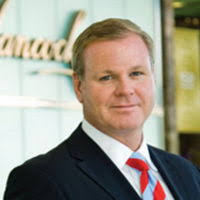 Mr. Arnott describes his background as somewhat atypical among public company CEOs in that he had lots of operations experience, but relatively little formal leadership training, when he started as CEO. His style is therefore largely self-taught, but I was not surprised that his sentiments echoed what The Sustainable Innovation MBA has taught us so far.
Mr. Arnott describes his background as somewhat atypical among public company CEOs in that he had lots of operations experience, but relatively little formal leadership training, when he started as CEO. His style is therefore largely self-taught, but I was not surprised that his sentiments echoed what The Sustainable Innovation MBA has taught us so far.
A theme that recurred throughout our conversation is that Mr. Arnott sees his role much more as a people-managing job rather than a task-managing job. From his stated goal of assembling his core team so that he can (humbly) say “I’m the dumbest one in the room,” to insisting that “our business can’t be successful unless our customers are successful,” Mr. Arnott stressed in all his answers that maintaining personal relationships and strong organizational culture are key pieces of his job description. He underscored this point by repeating that his goal was to create a family-like atmosphere. For example, on the day I spoke with him, he had been to an office holiday party at a branch office in Portsmouth, NH in order to “stay visible and accessible to the people there.”
One challenge for him is that, since he has intimate knowledge of his business’ operations, he has to consciously work to not get too far “down in the weeds” with minutiae because, although he cares deeply about these details, “if you come across as too frantic or intense then you become unapproachable and you lose touch with people.” For me, this idea harkened back to Joe Fusco’s oft-quoted line that “leadership is a love affair with the truth.” In order to make the best decisions for his organization, Mr. Arnott’s strategy is to carefully manage all the personal relationships his job presents so that he knows he has the best possible information — the truth. Very consistent with The Sustainable Innovation MBA worldview!



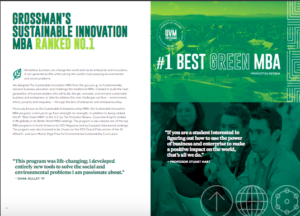
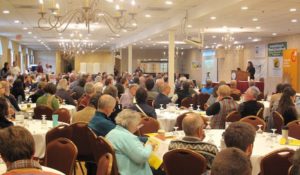 A large portion of the conference’s attendees were people serving on local energy committees — people looking for ways to identify action plans for their towns and communities to implement specific environmentally minded policies and improvements.
A large portion of the conference’s attendees were people serving on local energy committees — people looking for ways to identify action plans for their towns and communities to implement specific environmentally minded policies and improvements.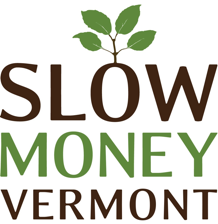 On December 6, Slow Money Vermont hosted its 3rd annual Entrepreneurial Showcase at the Main Street Landing Performing Art Center in Burlington. Together with the Moulton Law Group, Milk Money, Flexible Capital Fund, City Market, and other sponsors, the program brought together entrepreneurs and investors with a shared vision for local, sustainable food and farms. Slow Money Vermont “catalyzes new investment opportunities in the people, businesses and community that contribute to a sustainable food economy.” A project of the Farm to Plate Network, Slow Money Vermont is part of a national movement headquartered in Boulder, Colorado.
On December 6, Slow Money Vermont hosted its 3rd annual Entrepreneurial Showcase at the Main Street Landing Performing Art Center in Burlington. Together with the Moulton Law Group, Milk Money, Flexible Capital Fund, City Market, and other sponsors, the program brought together entrepreneurs and investors with a shared vision for local, sustainable food and farms. Slow Money Vermont “catalyzes new investment opportunities in the people, businesses and community that contribute to a sustainable food economy.” A project of the Farm to Plate Network, Slow Money Vermont is part of a national movement headquartered in Boulder, Colorado.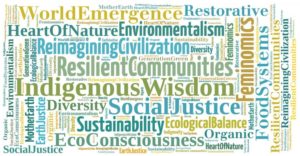 One of the key points many of the speakers made throughout the weekend was on mindset. Changing mindsets about the current globalized economy is the first step towards changing the system as a whole. One of the ways speakers encouraged a change in mindset was to recognize that in our current system we commodify all aspects of our life. Indigenous Leader
One of the key points many of the speakers made throughout the weekend was on mindset. Changing mindsets about the current globalized economy is the first step towards changing the system as a whole. One of the ways speakers encouraged a change in mindset was to recognize that in our current system we commodify all aspects of our life. Indigenous Leader 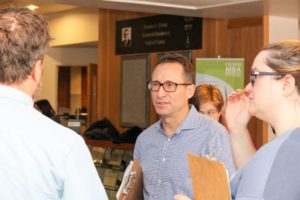 On the last day of November, the students of The Sustainable Innovation MBA hosted their annual Business Model Trade Show in the bustling lobby of Kalkin Hall. Visitors toured booths, sampled products and learned about the creative enterprises students have been working on throughout Module 2. For the students, it was a great opportunity to hone their elevator pitch and get feedback for their business ideas from noted visitors like venture capitalist and UVM alum
On the last day of November, the students of The Sustainable Innovation MBA hosted their annual Business Model Trade Show in the bustling lobby of Kalkin Hall. Visitors toured booths, sampled products and learned about the creative enterprises students have been working on throughout Module 2. For the students, it was a great opportunity to hone their elevator pitch and get feedback for their business ideas from noted visitors like venture capitalist and UVM alum 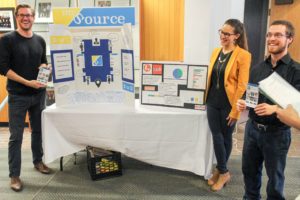 Many of the businesses focus on creating consumer goods that fill an unmet or underserved need in the marketplace. For instance, B3 is a consumer health company that offers simple, effective and environmentally friendly shampoo products made entirely from water, baking soda, and essential oils. Visitors to the trade show learned that the average shampoo contains more than 30 ingredients, many of which are known to cause adverse health and environmental effects. Another team of students with science and engineering backgrounds created Conscious Coffee Pods: small on the go servings of coffee in an algae-based pod that are shelf-stable, easily dissolved in water, and produce no packaging waste. Yet a third team created Flip Balm, an on the go algae-based sunscreen that attaches to a wristband made of recycled ocean plastic.
Many of the businesses focus on creating consumer goods that fill an unmet or underserved need in the marketplace. For instance, B3 is a consumer health company that offers simple, effective and environmentally friendly shampoo products made entirely from water, baking soda, and essential oils. Visitors to the trade show learned that the average shampoo contains more than 30 ingredients, many of which are known to cause adverse health and environmental effects. Another team of students with science and engineering backgrounds created Conscious Coffee Pods: small on the go servings of coffee in an algae-based pod that are shelf-stable, easily dissolved in water, and produce no packaging waste. Yet a third team created Flip Balm, an on the go algae-based sunscreen that attaches to a wristband made of recycled ocean plastic.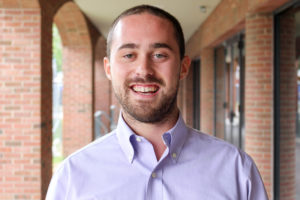 What has been your favorite part/element of the program thus far?
What has been your favorite part/element of the program thus far?